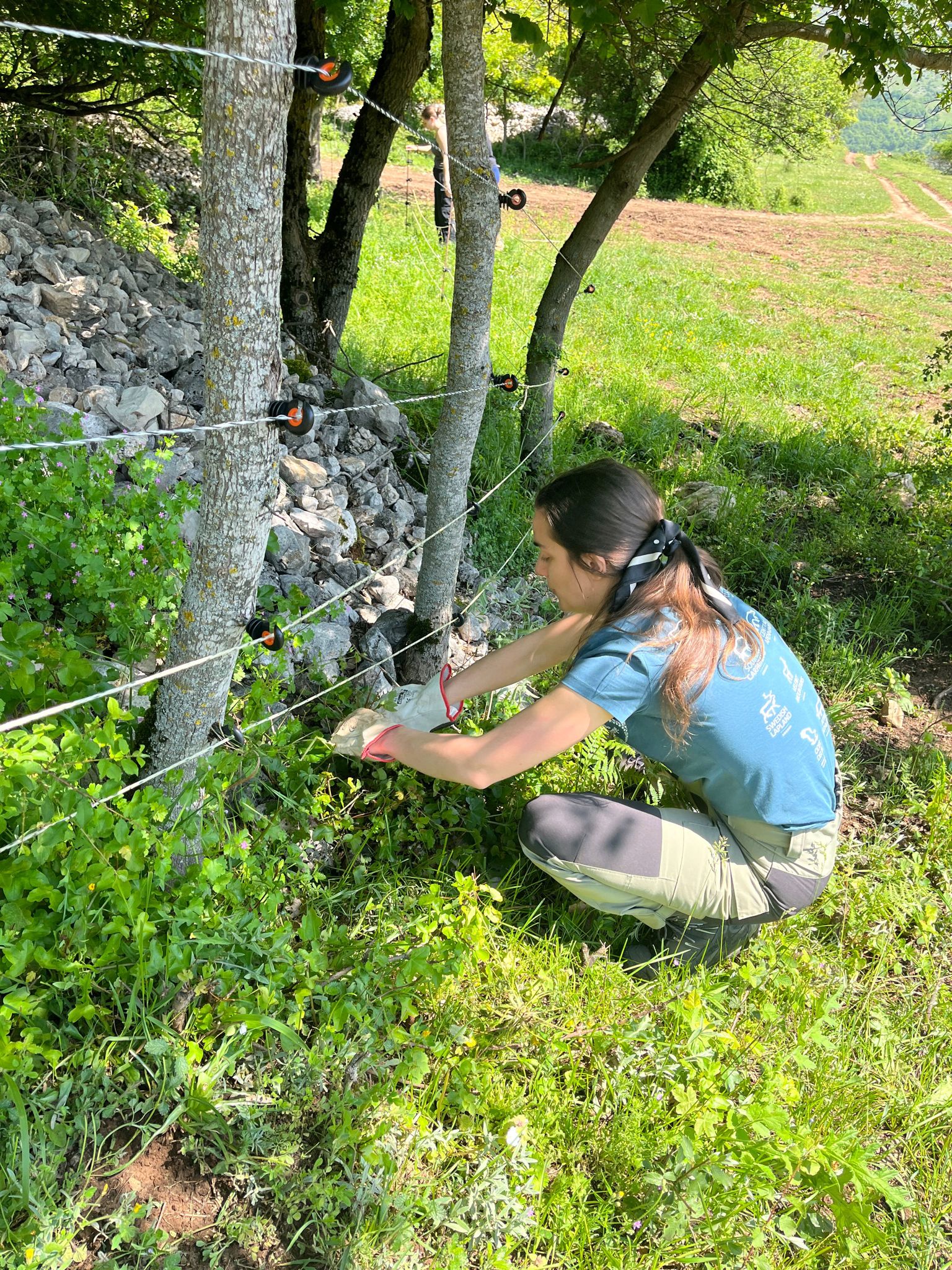The two organizations have recently organized events dedicated to young people to address the theme of rewilding, the applications on the territory in the Central Apennines and discuss together the actions that people can put in place to increase the movement.
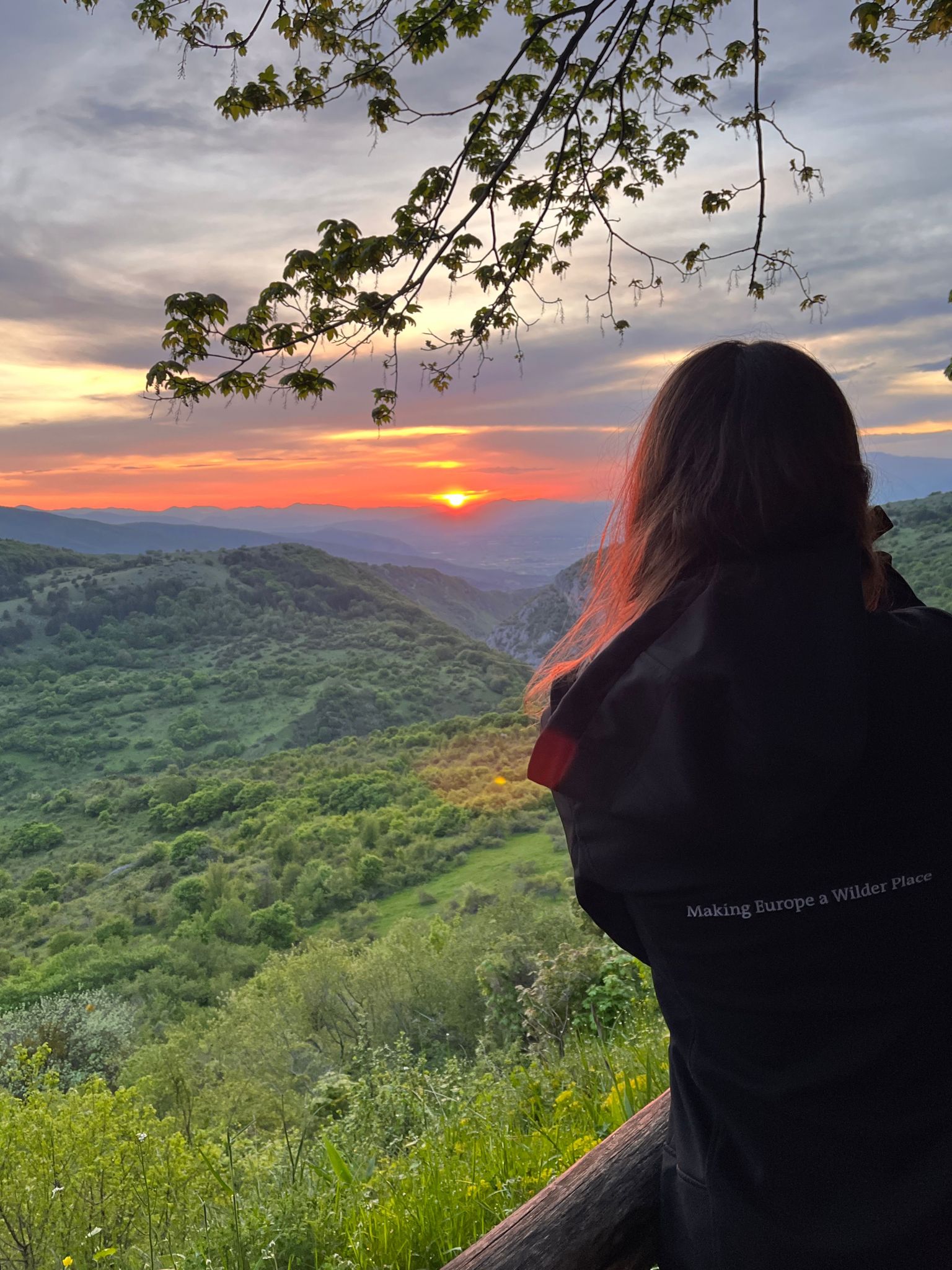
In the last forty years, environmental protection and climate change are topics that everyone has heard about. However, talking about it does not always mean having the opportunity to discuss concrete solutions, or being able to reconcile the desire to be part of the change with a career. Feeling helpless witnessing the great transformations our planet and society are facing and seeking security in a movement that can offer tangible solutions, are feelings familiar to many of those who enter the world of environmental protection even if only out of curiosity.
These considerations are the foundation of the two events, organized in June, born from the collaboration between the Rewilding Apennines (RA) team and the coordinator of European Young Rewilders (EYR) Giulia Testa, during her volunteering experience in the Central Apennines.
As coordinator of EYR, Giulia knows the needs and stories of many peers who approach rewilding as a way to actively contribute to the protection and restoration of the environment. As a volunteer, she had the opportunity to listen to the needs and points of view of young people from all over Europe who are engaged in ecosystem restoration actions on a daily basis.
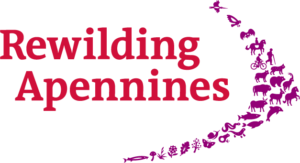
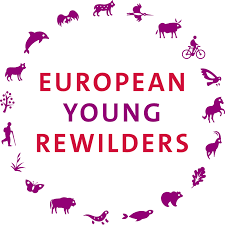
Taking into account both perspectives and the desire to involve local communities in the activities of Rewilding Apennines, we organised two parallel events in which Giulia talked about rewilding, its founding principles and its future prospects to two different categories of young people: the volunteers of Rewilding Apennines, and all those who are intrigued by the concept of rewilding and would like to be an active part of the change.
“For many volunteers, the experience with Rewilding Apennines is the first-time hearing about the term rewilding, and actions taken to restore ecosystems. Giulia’s presentation with the volunteers was an opportunity to gain a clearer idea of what rewilding is and the long-term implications and benefits of restoring our ecosystems. Giulia’s presentation highlighted the importance of being a young rewilder, and the potential we have to upscale and shape rewilding as it is. The presentation was equally a moment to exchange with people from different backgrounds and upbringings; but who are all brought together for one common cause, and who all share the same passion and respect for rewilding and the environment.”, says French volunteer Aliya Ballarin.
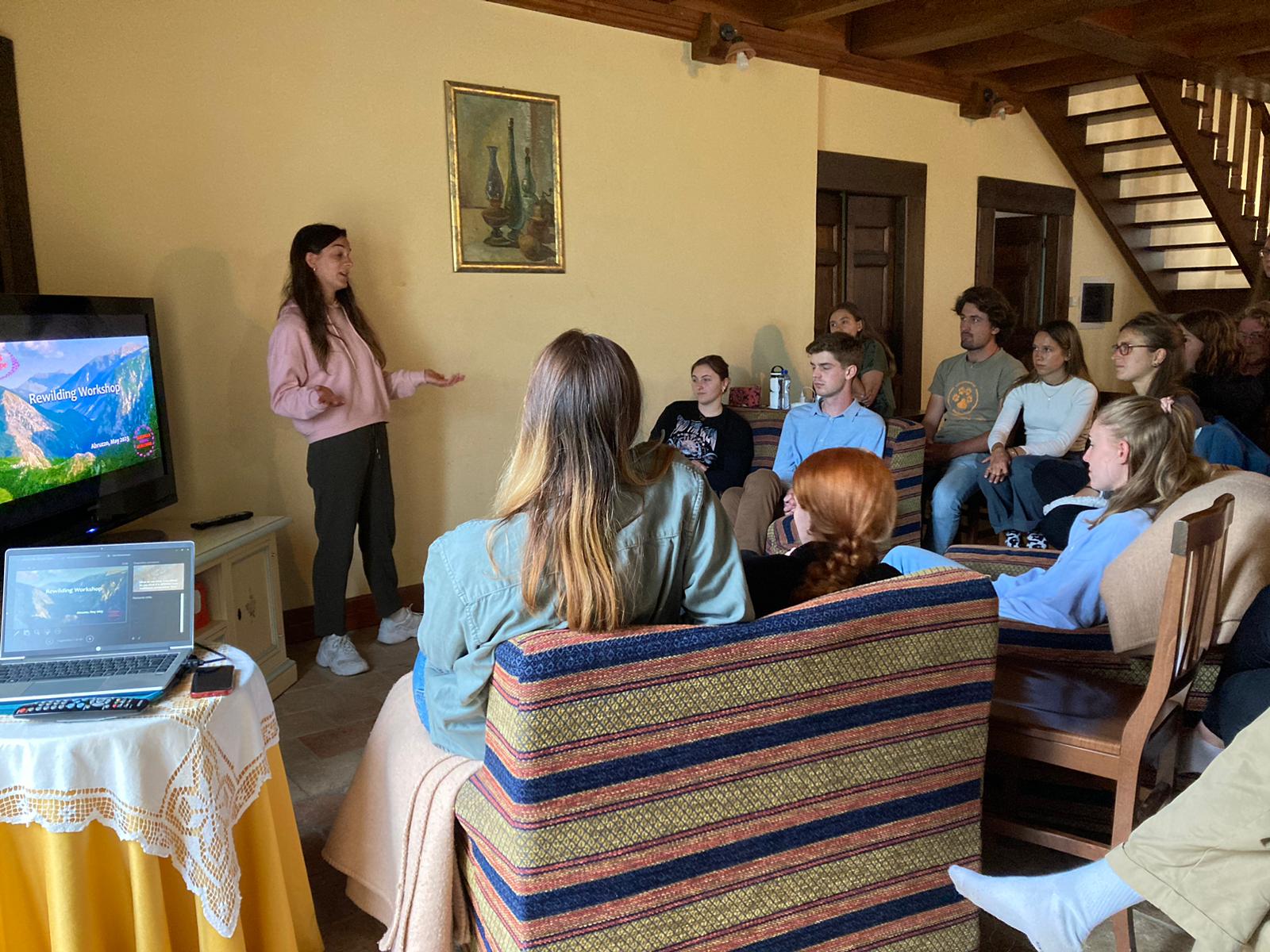
Giulia’s workshop with Rewilding Apennines volunteers was focused on the rewilding philosophy and its foundations. The goal was to offer a broader perspective on the daily actions that volunteers carry out in the Central Apennines area. Removing decades-old barbed wire from the mountains, building electrified fences to prevent wild animals from damaging farmers’ properties, monitoring fauna presence and activities through the use of camera traps, may seem like an end in itself. Giulia, however, shifted the attention from the individual actions to the grand design behind them: restoring the functionality of ecological processes so that they can return to function independently, and allow people and wild animals to share the territory and resources while minimizing conflicts.
Emphasis was also placed on the important role that young professionals and students have in developing the rewilding movement, which has only recently entered the European scene. “Young people are increasingly realizing that protecting what is left of nature is no longer enough, we need to restore what has been lost. In a context where environmental policies constantly move the necessary actions into the future, the role of young people will be increasingly crucial” declares Giulia. The second event, entitled “Rewilding Open Day” to deliberately refer to a perspective of meeting and participatory training, and held in the heart of Sulmona, aimed to introduce the concept of rewilding to a more general public. Once again, the focal point was the idea of reintroducing or protecting a species in order to conserve or restore an entire natural process, as well as the relationship between fauna and anthropic activities. The discussion then moved on to the concept of fauna management: could monitoring animal activities and placing fences to protect orchards or beehives be considered management? Does managing fauna mean, as is often understood in a more traditional view, controlling their numbers through human intervention? Or is human activity the only thing we have to manage?
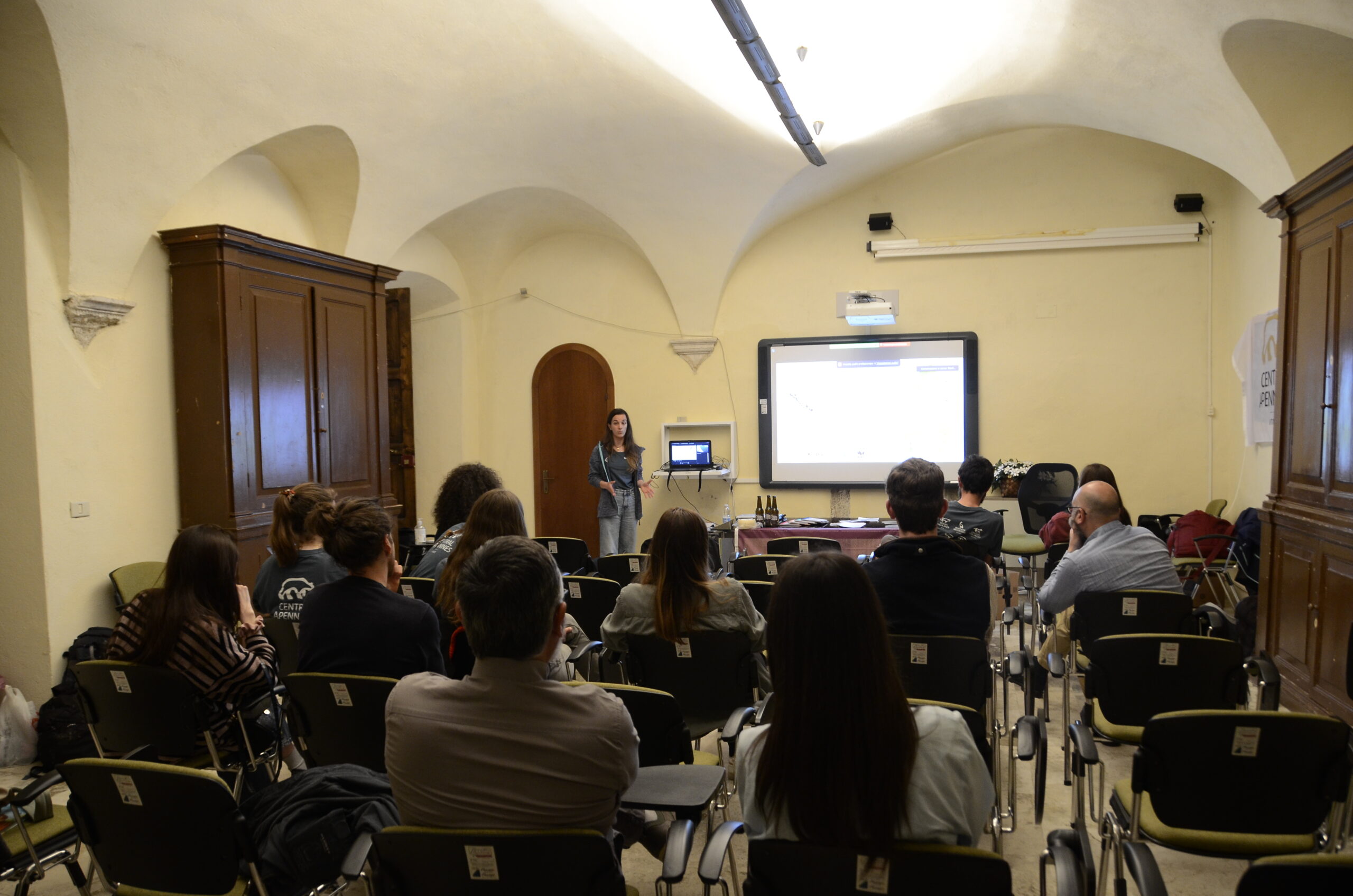
In her presentations Giulia also emphasized the loss of biodiversity. “The reference point – which coincides with an objective – for ecological restoration is often less ambitious than it should be. The reason behind this is that we refer to more and more recent environmental conditions and, due to progressive environmental degradation and species losses, we have normalized negative environmental conditions and a low number of wild species” underlines Giulia. Thinking of a Europe of large pastures and woods, inhabited by a real megafauna seems science fiction; yet it is part of a not too far past of our continent. In this context, even imagining it with thousands of large predators seems to be questionable. What, then, is the past condition referred to when talking about restoring nature? Should we compare the current successes to a near extinction parameter or to an ecologically thriving wildlife population? Also in this case, rewilding is a practice that satisfies both the most ambitious and the most realistic imaginaries by attempting to restore not the presence of the individual species that have characterized the past of a territory, but the processes that allow natural environments to be functional and autonomous.
Lastly, both meetings addressed the theme of the work market, which nowadays requires multifaceted professionals oriented towards environmental protection. As it has been emphasized several times, it is not necessary to be part of an association that has “Rewilding” in its name to be part of the movement. One is part of it when one applies the principles and good practices of this philosophy in one’s sector. The world of environmental protection needs, together with biologists and ecologists, professional figures coming from the most disparate ambitions: from those who can deal with legislation, to those who are able to manage the financial aspect, from marketing and communication, planner and manager.
The presence of Giulia Testa and, through her, the collaboration between European Young Rewilders and Rewilding Apennines, have certainly laid the foundations for the expansion of that network of contacts and professionalism that crosses all of Europe, strengthening both the connection with the local in the Central Apennines is the spirit of collaboration between individuals from different nations but ready to work together for a common goal: the protection and restoration of ecosystems, and the enhancement of activities related to the natural world.
